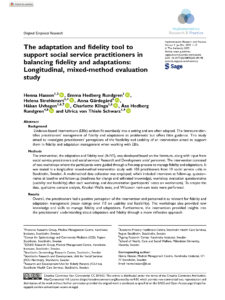Att balansera anpassning och följsamhet
 Background: Evidence-based interventions (EBIs) seldom fit seamlessly into a setting and are often adapted. The literature identifies practitioners’ management of fidelity and adaptations as problematic but offers little guidance. This study aimed to investigate practitioners’ perceptions of the feasibility and usability of an intervention aimed to support them in fidelity and adaptation management when working with EBIs.
Background: Evidence-based interventions (EBIs) seldom fit seamlessly into a setting and are often adapted. The literature identifies practitioners’ management of fidelity and adaptations as problematic but offers little guidance. This study aimed to investigate practitioners’ perceptions of the feasibility and usability of an intervention aimed to support them in fidelity and adaptation management when working with EBIs.
Methods: The intervention, the adaptation and fidelity tool (A-FiT), was developed based on the literature, along with input from social service practitioners and social services’ Research and Development units’ personnel. The intervention consisted of two workshops where the participants were guided through a five-step process to manage fidelity and adaptations. It was tested in a longitudinal mixed-method intervention study with 103 practitioners from 19 social service units in Stockholm, Sweden. A multimethod data collection was employed, which included interviews at follow-up, questionnaires at baseline and follow-up (readiness for change and self-rated knowledge), workshop evaluation questionnaires (usability and feasibility) after each workshop, and documentation (participants’ notes on worksheets). To analyze the data, qualitative content analysis, Kruskal–Wallis tests, and Wilcoxon rank-sum tests were performed.
Results: Overall, the practitioners had a positive perception of the intervention and perceived it as relevant for fidelity and adaptation management (mean ratings over 7.0 on usability and feasibility). The workshops also provided new knowledge and skills to manage fidelity and adaptations. Furthermore, the intervention provided insights into the practitioners’ understanding about adaptation and fidelity through a more reflective approach.
Conclusion: Practical tools are needed to guide professionals not only to adhere to intervention core elements but also to help them to manage fidelity and adaptation. The proposed A-FiT intervention for practitioners’ management of both fidelity and adaptation is a novel contribution to the implementation literature. Potentially, the next step is an evaluation of the intervention’s impact in an experimental design.
Läs hela artikeln
Publicerad:
25 december, 2023
 Background: Evidence-based interventions (EBIs) seldom fit seamlessly into a setting and are often adapted. The literature identifies practitioners’ management of fidelity and adaptations as problematic but offers little guidance. This study aimed to investigate practitioners’ perceptions of the feasibility and usability of an intervention aimed to support them in fidelity and adaptation management when working with EBIs.
Background: Evidence-based interventions (EBIs) seldom fit seamlessly into a setting and are often adapted. The literature identifies practitioners’ management of fidelity and adaptations as problematic but offers little guidance. This study aimed to investigate practitioners’ perceptions of the feasibility and usability of an intervention aimed to support them in fidelity and adaptation management when working with EBIs.




